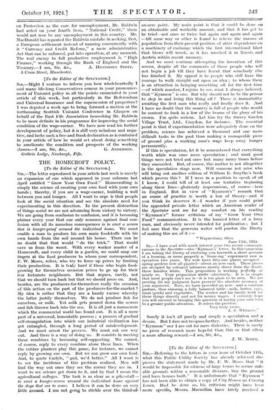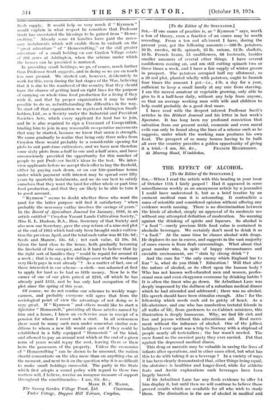[To the Editor of the SPECTATOR.] Sin,—Referring to the letters
in your issue of October 11th, what this Public Utility Society has already achieved dis-
proves the statement made by Mr. F. NV. Moses that " it would be impossible for citizens of large towns to secure suit-
able grounds within a reasonable distance, buy the ground and have houses built." It is unfortunate that " Kyninon " has not been able to obtain a copy of City Homes on Country Lanes. Had he done so, his criticism might have been more specific, Messrs. Macmillan have lately received a fresh supply. It would help us very much if " Kynmon " would explain in what respect he considers that Professor Scott has overstated the blessings to be gained from " Home- crofting." Already some 44 families have paid the neces- sary instalments which will enable them to embark on the " great adventure" of " Homecrofting," or the still greater adventure of a small holding cn our Garden Village estate of 202 acres at Addington, when the scheme under which the houses can be provided is matured.
In providing small holdings, we go, of course, much further than Professor Scott suggests, and in doing so we are on much less sure ground. We started out, however, deliberately to work for this, even during the last stages of the War, believing that it is due to the manhood of the country that they should have the chance of getting land on right lines for the purpose of carrying on whole-time food production for a living if they wish it, and that by proper organization it may be made possible to do so, notwithstanding the difficulties in the way. To start off that organization we registered Addington Small- holders, Ltd., as a Society under the Industrial and Provident Societies Acts, which every applicant for land has to join, and he is also required to sign a Covenant of Co-operation, binding him to join in any reasonable co-operative movements that may be started, because we know that union is strength. We came gradually to realize that being only three miles from Croydon there would probably be a considerable opening for plots to suit part-time cultivators, and we have now therefore some sixty plots from a-half to one and a-half acres, and have unconsciously provided the opportunity for this number of people to put Profersor Scott's ideas to the test. We inter- view applicants before we accept their offer to buy the freehold, either by paying cash down, or on cur hire-purchase terms under which payment with interest may be spread over fifty years by quarterly instalments, and we do our best to satisfy ourselves that they want the land for either whole or part time food production, and that they are likely to be able to turn it • to good account.
" Kynmon " seems to doubt whether those who want the land for the latter purpose will find it satisfactory "when probably the necessary-outlay involves- the savings of years." In the Board of Agriculture Journal for January, 1916, in an article entitled "Croydon Vacant Lands Cultivation Society," Miss E. L. Hudson, B.A., Hon. Secretary of that Society and also now our Secretary, gave the crop return of a nine-rod plot at the end of 1915 which had only been brought under cultiva- tion the previous April, and the total cash value was £6 12s. 9d; Seeds and Manure, 13s. Gd. ; net cash value, £5 19s. 3d. Given the land close to the house, both gradually becoming the freehold of the occupier, and is it hard to believe that by the right sort of families they "could be repaid for around £1 a week ; that is to say, a few shillings over what the workman very likely pays in rent already " ? As a matter of fact, one of those interested in our scheme—a clerk—was ashamed at first to apply for land as he • had so little money. Now he is the owner of one of our plots priced at £210, off which he has already paid £135, and he has only had occupation of the plot since the spring of this year. - Of course, we do not confine our schemes to weekly wage- earners, and probably everyone will agree that from the sociological point of view the advantage of not doing so is very great. If " Kynmon " and others would like to start a Siectator " Homecroft," providing all those articles named by him and a house, I know an ex-Service man in receipt of a pension for whom I covet such a start. In all seriousness there must be many such men under somewhat similar con- ditions to whom a new life would open out if they could be established in ri fully equipped " Homecroft " of the kind, and allowed to pay an annual rent which at the end of a given term of years. would repay the cost, leaving them or their heirs the possessors of the property. Unless the economics of " Homecrofting " can be shown to be unsound, the nation should concentrate on the idea more than on anything else at the moment, and next to it on the question why it is so difficult to make small holdings successful. .• The party in the State which first adopts a sound policy with regard to these two matters will, I believe, receive an imMenie measure of support throughout the cOnstituencies.—I am, Sir, &c., MARK B. F. MAJOR, The Surrey Garden Village Trust, pd. - Chairman. ' Tudor Cottage, Duppas Hill Terrace, Croydon. -



























































 Previous page
Previous page